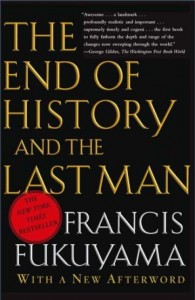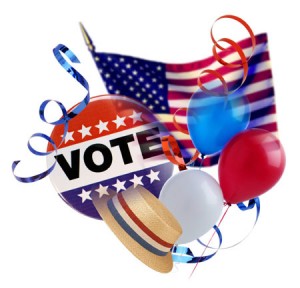This is part 2 of a 4-part article.
Read Part 1 Here
Read Part 3 Here
Read Part 4 Here
 Francis Fukayama predicted in the 1990s that with the fall of the Berlin Wall and end of the Cold War this conflict between the rich and poor nations was over; he called this “the end of history,” citing both Hegel and Marx.
Francis Fukayama predicted in the 1990s that with the fall of the Berlin Wall and end of the Cold War this conflict between the rich and poor nations was over; he called this “the end of history,” citing both Hegel and Marx.
In the ensuing model of the 1990s, where everybody was a “capitalist,” economies flourished.
With a united Germany, declining Soviet power, and the dot.com and real estate booms, everybody seemed to have forgotten Keynesianism in the Roaring 90s.
Everybody, that is, except the two big parties.
Entitlements, debts and deficits grew during the Bush, Clinton, Bush and Obama Administrations.
When 9/11 struck, everyone realized that history was far from over and that major challenges were still ahead. If the end of history had come, Keynes won.
Ironically, the fact that Keynesianism uses capitalistic means to accomplish socialistic ends allowed both liberals and conservatives to claim victory.
Conservatives rejoiced that socialism had lost to markets, and liberals celebrated that the era of big, irresponsible capitalism was over.
Unfortunately, what they brought us was far from the utopian ideal envisioned by socialism’s iconic philosophers or the freedom statesmen in history.
In fact, it was not so much socialism—where the state provides for all—as aristocracy, where the masses provide for the elite.
But back to our narrative: Keynesianism requires both political parties constantly and vocally doing battle. Neither can fully win or destroy the other; and when one wins an election the other is needed to play a minority role until it can win back the majority.
Whichever party is in power, the scope of government and big business must both increase during their tenure.
Of course, the result is that the far right hates Democrats when they are in power, and then turns on Republicans when they win and grow government. The far left does the opposite, hating the Republicans when they rule and then turning on Democrats in power for not doing enough.
Mainstream members of both parties simply support their party and dislike the opposition.
The key action in all this, the thing which makes Keynesianism work, the linchpin of the whole model, is for the citizenry to do nothing but vote.
Of course, they can live their lives, work at their jobs, send their kids to school and volunteer in their community. If they do these things, plus vote, they are good citizens. No more is asked, or wanted, from them.
 “Just shut up and vote,” is the subtle message from both parties.
“Just shut up and vote,” is the subtle message from both parties.
Of course, if one is an expert in politics, if it is their job, they are expected to do more than vote. They are required to study government, the issues and impact public opinion.
The same applies to professional journalists, attorneys, professors, etc. But this only applies to professors of political science, law, public policy or a related field.
Professors of literature or chemistry, for example, like postal workers and soccer coaches, are encouraged to leave governance mostly to the experts.
This cynical view is, unfortunately, widespread. Keynesianism depends on a society of experts where nearly everyone leaves governance to the political professionals.
Citizens are subtly taught that voting is the role of citizenship, along with serving on a jury if called up, and to otherwise leave governance to the experts.
After all, their party is watching their back for them and keeping the other “evil” party from doing too much damage.
Or, if the other party becomes dangerous, their own party leadership and the media will let them know.
To be continued…
***********************************
 Oliver DeMille is the founder and former president of George Wythe University, a co-founder of the Center for Social Leadership, and a co-creator of TJEd Online.
Oliver DeMille is the founder and former president of George Wythe University, a co-founder of the Center for Social Leadership, and a co-creator of TJEd Online.
He is the author of A Thomas Jefferson Education: Teaching a Generation of Leaders for the 21st Century, and The Coming Aristocracy: Education & the Future of Freedom.
Oliver is dedicated to promoting freedom through leadership education. He and his wife Rachel are raising their eight children in Cedar City, Utah.






Speak Your Mind
You must be logged in to post a comment.